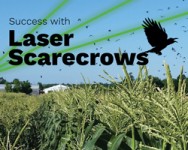Success with Laser Scarecrows in 2022
Event Details
Date
March 22, 2022
Time
9:00 am - 10:30 am EDT
Location
Online via Zoom
Cost
FREE!
Host
Cornell Cooperative Extension and University of Rhode IslandJulie Kikkert
585-394-3977 x404
email Julie Kikkert

Frustrated with bird control on your farm? Curious about what laser scarecrows are or how to optimize their set up? The University of Rhode Island and Cornell Cooperative Extension have teamed up to share their research and on-farm experiences using the University of Rhode Island laser scarecrow which utilizes a constantly moving green laser beam to scare birds away from fields. Newly improved laser scarecrow kits will again be available for 2022 for those who wish to partner with our research.
This workshop will feature a presentation by Rebecca Nelson Brown and David Brown of the University of Rhode Island about the laser scarecrow and what improvements have been made for 2022. Cornell Cooperative Extension Educators Chuck Bornt and Julie Kikkert will share their experiences testing the devices on New York farms. We will also open the floor to cooperating growers to share their tips for success on the farm.
COST AND REGISTRATION:
This online event is FREE! Registration is required to receive the Zoom link. The link will be in your confirmation email. Register now!
MORE INFORMATION:
Rebecca Nelson Brown
University of Rhode Island
brownreb@uri.edu or 401-874-2755
Julie Kikkert
CCE Cornell Vegetable Program
jrk2@cornell.edu or 585-394-3977 ext. 404
Chuck Bornt
CCE Eastern NY Commercial Horticulture Program
cdb13@cornell.edu or 585-859-6213
We hope you can join us!

Upcoming Events
African Eggplant Participatory Breeding Kick-Off
March 5, 2026
Join us to learn about the Cornell African Eggplant Research Project and learn how you can participate! African eggplant, also known as Bitterball, Garden Egg, Kittley and other names, is an important crop for many members of our community with heritage from regions such as sub-Saharan Africa, Southeast Asia, and Brazil. Since 2024, the Cornell African Eggplant Research Project has been collaborating with growers and community partners across New York to develop high-quality varieties adapted to the Northeast U.S. In this meeting, we will share information about growing and preparing African eggplant, highlight our research to date, and invite partners to collaborate with us in our 2026 participatory breeding and variety selection efforts.
COST: FREE! You must pre-register to receive the Zoom link.
Managing the Invasive Swede Midge Webinar
March 6, 2026
Swede midge is an invasive fly that causes serious economic losses to brassica crops. Due to its small size and hidden feeding habits, swede midge is often called an "invisible pest" and damage may be misdiagnosed. In this webinar, we will review the swede midge life cycle and crop damage symptoms, current management recommendations, new research findings, and highlights from on-farm case studies with a focus on organic management.
1.75 DEC pesticide recertification credits in categories 1a, 10, and 23.
Good Agricultural Practices (GAPs) Food Safety Training
March 10, 2026
Newark, NY
Learn about food safety on the farm! This event hosted by the Cornell Vegetable Program, Cornell Lake Ontario Fruit Team, CCE Wayne County, and the NYS Department of Agriculture, will cover good agricultural practices (GAPs) to help reduce the risk of microbial contamination on the farm, keeping food and consumers safe.


































